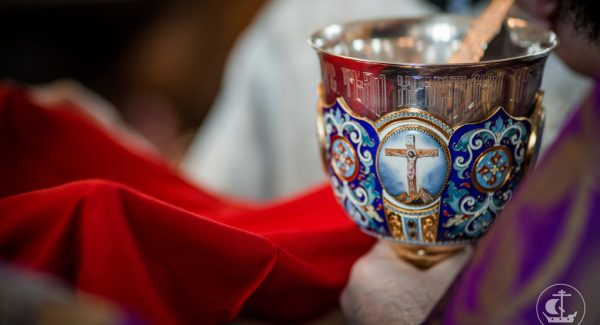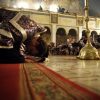Before we start‚ I want to qualify my words. This article is just a personal reflection‚ sparked by conversations I had with a few good friends of mine‚ to whom I am very grateful. It is not meant to convince anyone‚ nor to make a dogmatic or political stance‚ just my two cents for what they are worth.
The pandemic that has engulfed the world in its tiny viral claws has ignited a very vivid discussion in the Orthodox Church‚ regarding the way we distribute Holy Communion. As scientists‚ secular governments are attempting‚ in some places‚ to impose a change to our centuries old tradition of distributing the Body and Blood of Christ with a silver spoon‚ the Church is also trying to give a good response to this challenge.
Be warned‚ that I am not going to argue the method here‚ because I think this is not‚ ultimately‚ about the way we give Holy Communion. After all‚ even our ancient spoon tradition was new about ten centuries ago. But we should point out that it is only up to the Church to decide‚ as One Catholic Body‚ on how this is done. The Church‚ doesn’t take decisions based on pressure from the secular powers‚ nor because she wants to preserve life now‚ at any spiritual cost‚ but the decisions of the Church are always taken from the perspective of eternal life of her faithful in the Kingdom. If we need to change something or not‚ the Church will speak with authority‚ and we will be obedient to that. That’s the Orthodox way. More so‚ we should also recognize‚ that‚ eventually‚ all methods one could even devise under such pressure‚ would eventually fail under the increasingly severe scientific and secular scrutiny.
This is why I beg to offer that this is a theological rather than a practical question. By theological I don’t mean a question for seminary academics‚ but a question about how we understand God experientially‚ through the life of the Church in the Logos of God (Theos)‚ Jesus Christ. It is a question of how we approach God‚ in the Mysteries offered to us‚ both corporately‚ as a Church and personally‚ as faithful Christians.
We keep repeating that the Church is a hospital and Holy Communion is the medication for life‚ but I see also that‚ many times‚ we either forget or we fail to understand that the cure it offers is not for now. Christ came on earth and He cured some‚ but not all. He rather came to show that‚ in His presence‚ with faith‚ all could be healed‚ but not necessarily now‚ not just bodily‚ and for sure not automatically. He showed us just a sample‚ if you wish‚ of what is to come‚ of what we all can have access trough faith in Him.
After curing many and raising the dead He‚ Himself‚ suffered in the flesh and died on the Cross. For many seculars this was a failure‚ but for us‚ Christians‚ is the Way. Christ came to show that we need to learn to die in order to live. We cannot change the fallen and mortal nature of the flesh‚ we all are going to die‚ but we can transcend death‚ through faith in the resurrection of Christ.
The manipulated mob of Jesus’ time missed this point exactly and‚ when faced with a choice at the Praetorium‚ freed Barabbas‚ a symbol of political‚ material struggle‚ rather than freeing Jesus Christ‚ who was preaching freedom through detachment from the very life we cling on.
Our Communion “debate” is a repetition of this choice. Do we choose to fight the viruses‚ and our Church in the process‚ with raw scientific‚ medical power‚ in order to gain a few more years of earthly life‚ or we approach faithfully the Body and Blood of the One Who can cure all diseases and give us life everlasting?
The moment I choose to leave my house to come to Church‚ I assume a risk and I take on the struggle: I can encounter all kinds of perils and dangers on my way‚ I can be exposed to diseases I don’t even know‚ but I am willing to take all those risks to encounter Christ in the Chalice in the hope of eternal life.
The question is‚ therefore‚ not about reducing the risk of contamination through the spoon or the Chalice‚ is about my lack of willingness to accept the risk that inherently comes with life. What is that risk? Death. No method of Communion will guarantee that our Church worshiping experience will be 100% virus free and eliminate all risks. In the same way our food stores are not 100% virus free‚ nor the parks‚ nor any other place. So‚ if I am taking the risk to get food‚ or exercise for a temporarily life‚ should I not be willing to risk my temporary life for eternal life?
I am not saying we should not take precautions and respect what the science says‚ I think we should‚ but we also have to understand that we will never be able to live risk free‚ and for sure we won’t be able to eliminate death. All I am trying to propose‚ is that before we learn to live‚ we have to learn to die. There is no doubt about that in our faith. Every Sunday service is filled with the beautiful tension between death and resurrection. It is in the space‚ created by the two‚ that we‚ Christians‚ live. Christ is risen from the dead trampling death by death. This is the foundational principle of our Faith: through faithful death‚ we pass into eternal life in Christ.
This very belief has been and will always be fought back by any culture that is based on the idea that this life is everything and therefore we should preserve it‚ at any cost‚ for as long as we can. In this context‚ our Church is faced with a difficult decision today: to balance between the unchangeable‚ but hard‚ truth of our faith and our weakness in accepting the risks and the sacrifice that come with it. But‚ ultimately‚ this is the Church’s decision‚ no one else’s. Lord‚ we humbly pray‚ enlighten our Hierarchs!

















